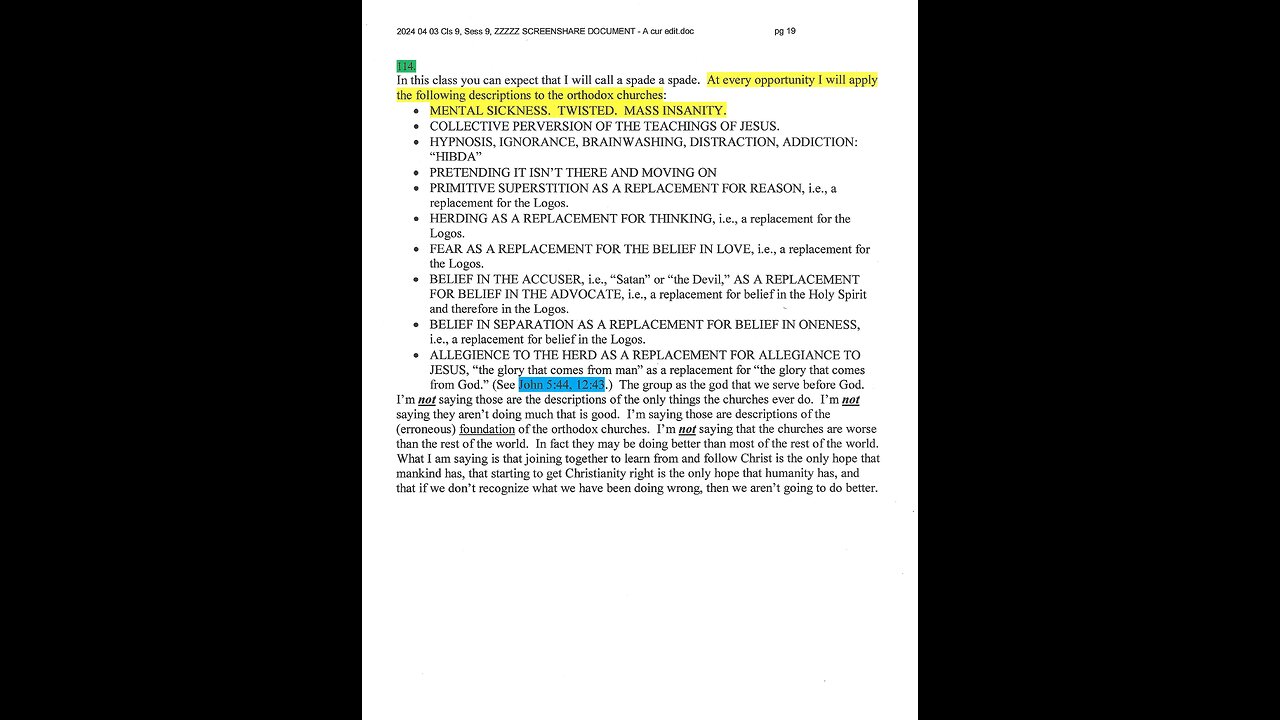Premium Only Content

46th session. 4-3-24. FUNDAMENTALS OF READING THE BIBLE
NOTES ON THE 4-3-24 CLASS
LAST EDITED 4-9-24
>> This class was a continuation of the 3-6-2024 class on the error of translating "Gehenna" into English as "hell." We also discussed the origins of the concept of eternal punishment. These two classes together are supremely important. In my opinion there is no way that one can really understand the Bible as a whole or the teachings of Jesus in particular without understanding the issues presented in these two classes.
CORRECTIONS TO MY STATEMENTS AT THE 4-3-24 CLASS
LAST EDITED 6-22-24 1620 HST
>> At 2:59 – 3:02, “November 11th” was meant to be “November 19th.”
>> At 31:06 to 31:08 with regards to the Douay–Rheims Bible, “wasn’t published later” was meant to be “wasn’t published until later.” According to https://en.wikipedia.org/wiki/Bible_translations_into_English, “The Old Testament was completed by the time the New Testament was published but, due to extenuating circumstances and financial issues, it was not published until nearly three decades later, in two editions: the first released in 1609, and the rest of the OT in 1610.”
>> At 55:15 to 55:38, Alexander conquered that part of the world in 332 BC. The Maccabean Revolt started in 167 and was complete in 140 BC.
>> At 56:10 to 56:26, Plotinus lived in the third century AD, not the fourth century. https://en.wikipedia.org/wiki/Plotinus gives his dates as born 204 or 205 and died 270.
>> At 1:20:20 to 1:20:29 I said that from David to Josiah was four hundred years. The dates of David’s reign are not historically certain, but the “Old Testament Chronology” at the front of my 1985 version of The NIV Study Bible gives 1010 to 970 BC as the dates of his reign. Josiah was eight years old when he became king; the reforms of Josiah probably began in about 621 BC. It those dates are accurate, then the actual range is 349 years.
>> At 1:21:00 to 1:21:03 “what they were doing was Auschwitz” should have been “a significant part of what they were doing was Auschwitz.”
>> At 1:36:35 to 1:36:47, “In the Gospel of Thomas, and also at John chapter three, he clearly says that we came from above, that we are here temporarily, and that we return to where we came from.” Actually it’s only clear at Thomas saying 49. In John chapter three you have to work it out rationally. We did that at the 5-28-23 class; see 1:07:30 to 1:20:19 on the unedited recording.
>> At 1:55:07 to 1:56:34 I said that our motivation to herd is the highest motivation for most people. That was an oversimplification and probably an overstatement. I hope to expand on this topic at a later class.
ADDITIONAL REFERENCES FOR THE 4-3-24 CLASS
LAST EDITED 6-22-24 1620 HST
>> For 1:17:11 to 1:17:26, a reference from the book of Isaiah where God tells the prophet that the people will not listen to him is Isaiah 6:9-12.
>> For 1:17:11 to 1:17:26, a reference from the book of Jeremiah where God tells the prophet that the people will not listen to him is Jeremiah 7:27-28.
>> For 1:17:46 to 1:18:04, see 2 Kings 22:1-14.
>> For 1:21:08 to 1:21:29 “worse than any of the Canaanites who had ever lived there before,” see 2 Kings 21:9-11.
>> For 1:36:24 to 1:36:35 “you are gods,” see Psalm 82:6 and John 10:34.
>> For 1:36:55 to 1:37:01, “in spirit and in truth,” see John 4:23-24.
>> For 1:39:25 to 1:39:37, the story of Lazarus and the rich man is found at Luke 16:19-31.
>> For 1:59:22 to 1:59:33 “you are gods,” see Psalm 82:6 and John 10:34.
-
 12:56
12:56
Benjamin Sahlstrom
6 hours agoTesla Powerwall 3 vs Anker SOLIX X1
-
 1:02:24
1:02:24
Timcast
4 hours agoBerkeley Goes BALLISTIC Over TPUSA Event, Massive BRAWL ERUPTS
161K134 -
 LIVE
LIVE
StoneMountain64
3 hours agoBattlefield REDSEC $100k TOURNAMENT
119 watching -
 57:04
57:04
Daniel Davis Deep Dive
7 hours agoRussia's Doomsday Weapon /MIT Prof. Ted Postol
15.2K6 -
 2:12:10
2:12:10
Steven Crowder
7 hours ago🔴Is This Really MAGA: What the Hell Is Donald Trump Doing?
464K546 -
 1:03:36
1:03:36
The Rubin Report
5 hours agoCNN Panel Looks Angry as Republican Points Out How Dems Shutdown Backfired
50.8K61 -
 1:11:36
1:11:36
Sean Unpaved
4 hours agoBen Johnson Has Caleb Williams Playing Best Football Of His Career! | UNPAVED
22.7K1 -
 3:11:24
3:11:24
Right Side Broadcasting Network
7 hours agoLIVE REPLAY: President Trump’s Veterans Day Wreath Laying Ceremony and Address - 11/11/25
78.3K19 -
 18:09
18:09
Professor Nez
4 hours ago🚨🔥HOLY MACKEREL! Chuck Schumer FLEES the Senate Floor when CONFRONTED on Obamacare FRAUD!
36.9K31 -
 1:07:04
1:07:04
The White House
6 hours agoPresident Trump and Vice President JD Vance Deliver Remarks
38.7K23